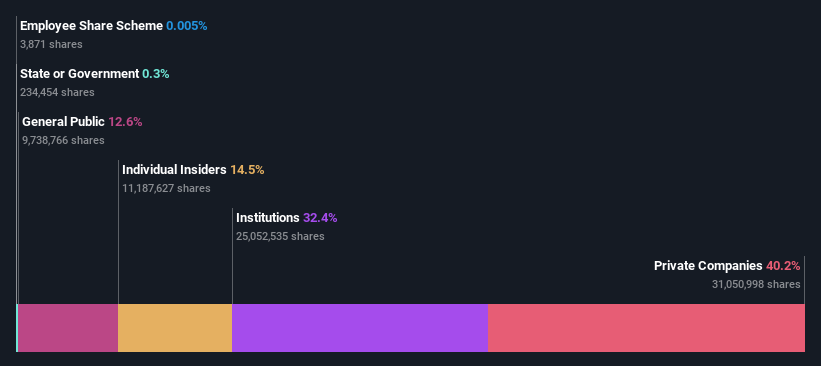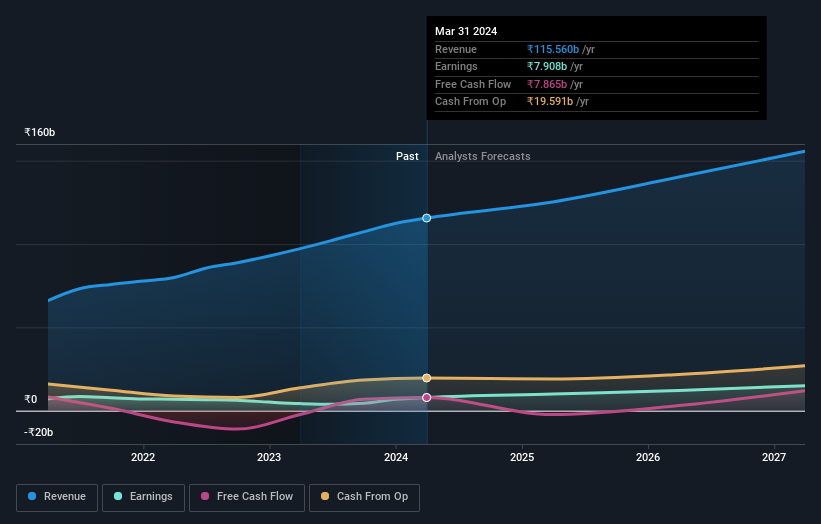Stock Analysis
- India
- /
- Basic Materials
- /
- NSEI:JKCEMENT
J.K. Cement Limited's (NSE:JKCEMENT) top owners are private companies with 40% stake, while 32% is held by institutions

Key Insights
- The considerable ownership by private companies in J.K. Cement indicates that they collectively have a greater say in management and business strategy
- The top 3 shareholders own 51% of the company
- Insider ownership in J.K. Cement is 14%
To get a sense of who is truly in control of J.K. Cement Limited (NSE:JKCEMENT), it is important to understand the ownership structure of the business. With 40% stake, private companies possess the maximum shares in the company. Put another way, the group faces the maximum upside potential (or downside risk).
Institutions, on the other hand, account for 32% of the company's stockholders. Insiders often own a large chunk of younger, smaller, companies while huge companies tend to have institutions as shareholders.
Let's delve deeper into each type of owner of J.K. Cement, beginning with the chart below.
Check out our latest analysis for J.K. Cement

What Does The Institutional Ownership Tell Us About J.K. Cement?
Institutions typically measure themselves against a benchmark when reporting to their own investors, so they often become more enthusiastic about a stock once it's included in a major index. We would expect most companies to have some institutions on the register, especially if they are growing.
We can see that J.K. Cement does have institutional investors; and they hold a good portion of the company's stock. This implies the analysts working for those institutions have looked at the stock and they like it. But just like anyone else, they could be wrong. It is not uncommon to see a big share price drop if two large institutional investors try to sell out of a stock at the same time. So it is worth checking the past earnings trajectory of J.K. Cement, (below). Of course, keep in mind that there are other factors to consider, too.

Hedge funds don't have many shares in J.K. Cement. Our data shows that Yadu International Ltd is the largest shareholder with 40% of shares outstanding. In comparison, the second and third largest shareholders hold about 5.5% and 5.0% of the stock.
After doing some more digging, we found that the top 3 shareholders collectively control more than half of the company's shares, implying that they have considerable power to influence the company's decisions.
While it makes sense to study institutional ownership data for a company, it also makes sense to study analyst sentiments to know which way the wind is blowing. Quite a few analysts cover the stock, so you could look into forecast growth quite easily.
Insider Ownership Of J.K. Cement
The definition of an insider can differ slightly between different countries, but members of the board of directors always count. Management ultimately answers to the board. However, it is not uncommon for managers to be executive board members, especially if they are a founder or the CEO.
Insider ownership is positive when it signals leadership are thinking like the true owners of the company. However, high insider ownership can also give immense power to a small group within the company. This can be negative in some circumstances.
Our most recent data indicates that insiders own a reasonable proportion of J.K. Cement Limited. It is very interesting to see that insiders have a meaningful ₹48b stake in this ₹329b business. It is good to see this level of investment. You can check here to see if those insiders have been buying recently.
General Public Ownership
The general public-- including retail investors -- own 13% stake in the company, and hence can't easily be ignored. While this size of ownership may not be enough to sway a policy decision in their favour, they can still make a collective impact on company policies.
Private Company Ownership
Our data indicates that Private Companies hold 40%, of the company's shares. It's hard to draw any conclusions from this fact alone, so its worth looking into who owns those private companies. Sometimes insiders or other related parties have an interest in shares in a public company through a separate private company.
Next Steps:
It's always worth thinking about the different groups who own shares in a company. But to understand J.K. Cement better, we need to consider many other factors. For example, we've discovered 2 warning signs for J.K. Cement that you should be aware of before investing here.
If you would prefer discover what analysts are predicting in terms of future growth, do not miss this free report on analyst forecasts.
NB: Figures in this article are calculated using data from the last twelve months, which refer to the 12-month period ending on the last date of the month the financial statement is dated. This may not be consistent with full year annual report figures.
Valuation is complex, but we're helping make it simple.
Find out whether J.K. Cement is potentially over or undervalued by checking out our comprehensive analysis, which includes fair value estimates, risks and warnings, dividends, insider transactions and financial health.
View the Free AnalysisHave feedback on this article? Concerned about the content? Get in touch with us directly. Alternatively, email editorial-team (at) simplywallst.com.
This article by Simply Wall St is general in nature. We provide commentary based on historical data and analyst forecasts only using an unbiased methodology and our articles are not intended to be financial advice. It does not constitute a recommendation to buy or sell any stock, and does not take account of your objectives, or your financial situation. We aim to bring you long-term focused analysis driven by fundamental data. Note that our analysis may not factor in the latest price-sensitive company announcements or qualitative material. Simply Wall St has no position in any stocks mentioned.
Valuation is complex, but we're helping make it simple.
Find out whether J.K. Cement is potentially over or undervalued by checking out our comprehensive analysis, which includes fair value estimates, risks and warnings, dividends, insider transactions and financial health.
View the Free AnalysisHave feedback on this article? Concerned about the content? Get in touch with us directly. Alternatively, email editorial-team@simplywallst.com
About NSEI:JKCEMENT
J.K. Cement
Manufactures and sells cement and its related products under the J.K.
Solid track record with adequate balance sheet and pays a dividend.

